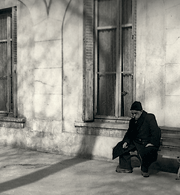Existence, by J.G. Bennett
Existence, by J.G. Bennett. Back in print after thirty-three years!
Edited & compiled by Anthony Blake.
Updated for our present time with a new chapter, “The Dimensional Framework of the Natural Sciences”, a paper by J.G. Bennett; a foreword essay by Anthony Blake; and an index of names and special words.
We turn to non-existence. In ordinary parlance, the concept rather means something that is less than existing, on the lines of “illusion.” For Bennett, it was the converse. If existence arises from a set of conditions of limitation (designed of course to be mutually consistent) then what might be the content of what is beyond such constraints? We return to the question of experience. Unless, in some way, what is beyond existence is contained in or is “with” experience it would be entirely useless to even speak of it at all. As we shall see, Bennett endeavored to see that in experience there was always something more than existence and, even, something that did not exist at all.
First, there is a major step to make. Somehow, we have to strip away all the personal hang-ups as it were that concern my experience as opposed to your or any other experience. We need to contemplate experience without personality and, stretching the point further, without regard to any particular type of vehicle of experience such as an organism. When Bennett did this he arrived at what the Greeks called hylé and the Jews ylem; in Scholastic philosophy of the Middle Ages it was prime matter or in crude terms “basic stuff.” Clearly, Bennett’s hylé was not matter in the usual sense at all, that is “chunks of stuff” like atoms. It was in some sense prior to the existence of anything bodily. He was determined to avoid the Cartesian problem of postulating matter without mind, where mind has to be “added on” rather as an afterthought—or, conversely, mind taken as primary and matter then added on. Like Bohm, he considered that we take to be mental or physical came out of the same stuff. Though Bohm might call it “holomovement” rather than a kind of stuff he shared the same approach.
One has to contemplate experience in this way for oneself, which means to open oneself to receiving a subtle perception or insight; no description or explanation can do this for us. Interestingly enough, this becomes a prime example of what mainstream philosophy calls phenomenology in which the critical step of the method is to suspend imposed conceptions leaving what “is” to speak for itself. The very act of contemplation is identical with the “experience of experience.” Philosophy speaks of “phenomena” which is a different usage from that of Bennett, because such “phenomena” include mental acts and, indeed, all that can be contained in existence.
Phenomenology strives to be true to experience in a way that stands—somehow—prior to having thoughts about experience. In classical Husserlian phenomenology what is revealed is the “essential consciousness” and the “transcendental ego.” In Bennett’s version, he says that what is revealed are two aspects or realities of experience he calls being and will, which to some degree correspond with Husserl’s fundamental concepts. One of his major archetypal ideas was that experience discloses itself with three aspects: Function, Being and Will. Function is a name for what “goes on” in existence. Being is the name for what is beyond existence and does not “go on” at all but is qualitative. Will is the name for the non-existent from which all existence originates as a limitation. Experience is the coming together of all three. The reality of complete coincidence of all three can be called God but Bennett tends to equate God mainly with Will. God is implicit in all experience.
In this scheme, the scientist appears to make a split in experience—or “cut”—so that on one side is the world of function and existence, and on the other are the aspects of being and will that enable him to be a creative human being. We then extrapolate the scheme to say that the theologian is one who separates out the world of will leaving the aspects of being and function behind that enable him to think and comprehend. We know that Bennett assigned the artist to the realm of being, and thus complete the trinity of specialization._From the foreword essay by Anthony Blake,
author of The Intelligent Enneagram


No comments yet.